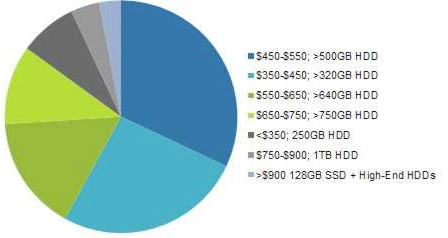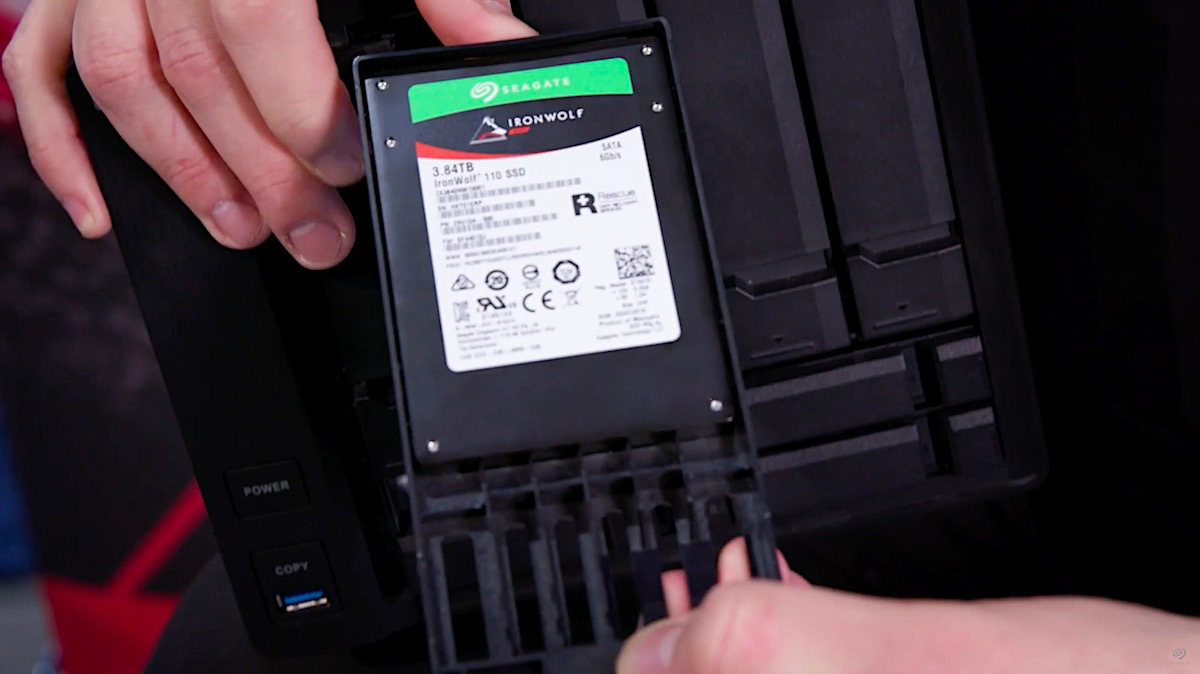.
“The market-share rankings show that SSD-based notebook PCs like Apple Inc.’s MacBook Air presently pose no threat to the much larger universe of HDD-based mobile PCs,” said Fang Zhang, analyst for storage systems at IHS according to this post on Storage Newsletter.
No doubt that the tablet market – primarily the Apple iPad – and the use of flash storage (or SSD) has taken a bite out of new PC shipments over the past couple years, but for consumers craving the familiar experience of traditional notebook computing, SSD has not had much of an impact – coming in at 3% market share.
What is interesting about this data is that over 50% of the market is demanding notebooks with 320GB to 500GB worth of storage – almost 8x what you would see in common tablet configuration. What this tells me is that though 64GB of storage is nice when it comes to performance, weight, and thin design, but it capacity continues to outweigh these features. What it also says is that the cloud is not the solution to make up the 256GB to 436GB shortfall. Storing that much data in the cloud is cost prohibitive for most consumers.
But, as the Storage Newsletter post points out, there are new solutions emerging in the form of the yet-to-be-released Surface tablet PC from Microsoft, and flash prices continue to fall. The question being, what it the magic SSD capacity and price point where consumers’ buying behavior shifts from the sub $700 notebook with 320GB or 500GB hard drives, to a solution with SSD? Storage Newsletter suggests 128GB and sub $700.
The shift is an evolution.
Of course, hard drive makers aren’t simply waiting for the SSD market to take its eventual course. The advent of Hybrid hard drive technology illustrates this. Solid State Hybrid Drives – SSHDs (or as some have called them, hybrid hard disk drives — HHDDs) combine a small amount of SSD (8GB) with spinning disk to deliver SSD like performance, HDD like capacity (750GB), at a much sweeter price point. Today, these drives are designed for traditional notebooks having a standard 9.5mm Z-height, but as we have seen from Seagate, WD, Hitachi, and Toshiba, thin hard drives boasting a 7mm Z-height are the future. When you combine the 7mm height with Hybrid technology, the attractive choices broaden.
Capacity is another variable in this equation. By the time the prices drop on a 128GB SSD, will comparable HDDs be at 1TB? The question being, do technology and user behavior change enough to drive that magic capacity and price point for legitimate SSD notebook penetration higher…and how much higher?
What would you choose? $700 notebook with 128GB of SSD, or 1TB of HDD storage?
Related Posts:
Wintel defined the PC for 2 decades…were we all wrong?
Is the tablet craze coming to an end already?
5 reasons Ultrabooks should include hybrid drives









I have a Dell Inspiron 15R, intel core i3 370M (yes, first gen), and came with 320 GB 5400 rpm samsung disk. For my storage needs, I recently bought a Seagate Goflex 3TB external hard disk, while I swaped the internal hard drive for a Crucial M4 SSD, 128 GB. Currently, I don’t see any point in having an HDD inside my laptop, because having all my data in a external hard drive means I can take the drive anywhere, without the laptop, and connect it to any USB 2.0 or USB 3.0 and still have access to all my content, whereas all the space that I need in the internal hard drive for programs and system is about 45GB, so I am almost wasting 80 GB of SSD capacity.
Sure, if I had games or if I made a living processing my own original Full HD Movies with 3D (and discrete GPU, I don’t have one yet), I would have my SSD filled up, so I would opt out for 180GB (Intel) or 256GB (Crucial). But I wouldn’t but an HDD, the performance is way too low.
[…] smarter, faster, lighter, but they still want the capacity. I blogged about this very subject here. As tablets and smartphones continue to continue to “take over,” and Ultrabooks gain […]
[…] Does storage capacity still trump performance in notebooks? […]